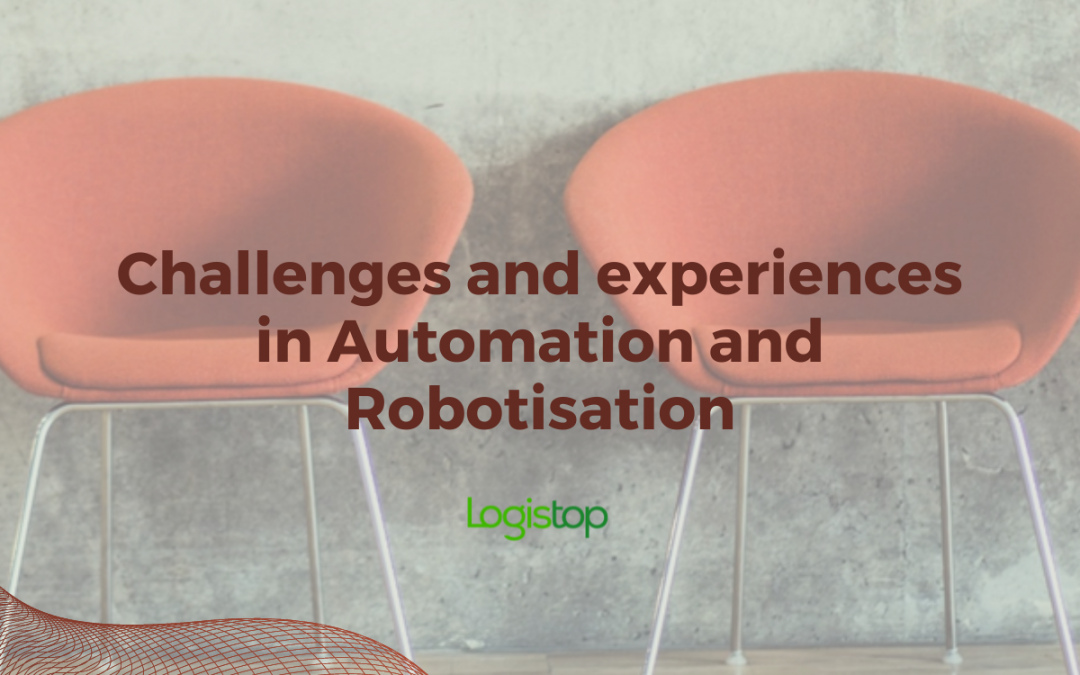-
One hundred professionals from the sector attended LogisTalks “Challenges and Experiences in Automation and Robotisation”.
-
Reduction of errors and increase in productivity, as the main benefits that automation makes possible.
-
The LogisTalks event “Challenges and Experiences in Automation and Robotisation”, organised by Logistop in collaboration with Fundación CARTIF and MANU-KET, took place with great success this Tuesday 12th September at the headquarters of Fundación CARTIF, located in the Technological Park of Boecillo, Valladolid.
The event, framed in Logistop’s strategic line “Digitalisation and automation of processes for an efficient and connected logistics” brought together experts and companies interested in automation and robotisation in the industry.
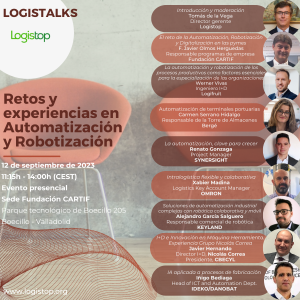
Sergio Sanz Hernando, deputy director general of the CARTIF Foundation, at the opening of the conference, highlighted the work carried out by the technology centres, emphasising the role of CARTIF in the entire R&D&I process through the generation of knowledge accessible to society as a whole, promoting both economic and social change.
Throughout the day, moderated by Tomás de la Vega, managing director of Logistop, topics of vital importance for the industry were addressed, with presentations and round table discussions in which experts shared their knowledge and experiences.
Javier Olmos, head of business programmes at the CARTIF Foundation, analysed the challenge of Automation, Robotisation and Digitalisation in SMEs. Javier presented the technology based on Artificial Intelligence that CARTIF has, which integrates artificial vision, collaborative robotics and mixed reality to automate both production and logistics processes. For this, he based his presentation on its application in industrial projects such as the 5R project, the new European research project that seeks to promote Human-Robot Industrial Interaction (HRI) in Europe through the AgileHRI concept and the CleanPorts 5.0 and HUMAIN projects with great impact on the automation of logistics operations.
“We are facing three major challenges: 1) sustainability, decarbonisation and reducing energy dependence; 2) digitalisation; and 3) automation”
Javier Olmos, Head of Business Programmes, CARTIF Foundation
Experiences and needs in automation
Werner Vivas, head of the projects area of Logifruit‘s, compartió con los presentes el importante papel que la tecnología desempeña como medio para anticiparnos a las necesidades y expectativas crecientes de los clientes y garantizar la calidad del servicio, con la automatización y robotización como factor esencial en la especialización de la organización.
Werner used several case studies to illustrate how Logifruit has been implementing automation and robotisation in its processes. He also highlighted the role that technology plays as a means of guaranteeing the quality of their packaging, analysing the cost of non-quality.
“Our aim is to automate 100% of our processes and operations in order to be able to focus our employees on functions that bring more value to the company and the customer”
Werner Vivas, Project Manager, Technical R&D Department, Logifruit
Next, Carmen Serrano Hidalgo, head of the warehouse tower at Bergé, analysed the challenges faced by a port operator in unloading and storage operations.
To this end, Carmen presented two automation experiences that Bergé has developed at the Huelva Terminal and at the Cartagena Operations Centre.
“Among the benefits that are generated when automating an unloading process is an increase in our performance, a reduction in the stay of ships in dock and, in addition, it allows a reduction in costs”
Carmen Serrano Hidalgo, Warehouse Tower Manager, Bergé
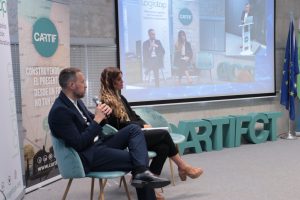
Innovative solutions and technology
Renato Gonzaga, Project Manager of SYNERSIGHT, analysed the advantages of automation through AGVs and AMRs and their contribution to the growth of companies. He also addressed aspects such as the different forms of automation, solutions adapted to each company and the advantages of implementation.
Renato also highlighted some of the main benefits of using AGVs/AMRs, including efficiency in the movement of materials, safety in the industrial environment, digitisation of processes, optimisation of storage spaces, operational flexibility and reduction of human errors.
“One of the most important steps in automating a process is to identify which process we want to automate and, once identified, to standardise the automation”
Renato Gonzaga, Project Manager, SYNERSIGHT
Xabier Madina, Logistics Key Account Manager at OMRON, presented the success story of the project to integrate a fleet of mobile robots (AMRs) to automate the intralogistics processes of the NORMAGRUP production plant, optimising the flow of raw materials, semi-finished products and end products between the different production areas of the plant and the central automated warehouse.
“We must move towards a flexible and collaborative intralogistics, making it possible to reduce errors and increase productivity”
Xabier Madina, Logistics Key Account Manager, OMRON
For his part, Alejandro García Salguero, the robotics sales manager at KEYLAND, analysed different industrial automation solutions with collaborative and mobile robotics that they are developing.
As Alejandro pointed out, in industry, solutions are always complex, but they can bring various improvements, such as, for example, to the workplace (both in terms of safety and ergonomics) and cycle times. He added that calculating ROI is fundamental for any company.
“An integrator is necessary whenever the process is complex. Its main virtue is the experience that will allow you to generate new ideas, knowledge of various technologies, as well as an overview of the specific needs of each project”
Alejandro García Salguero, Robotics Sales Manager, KEYLAND
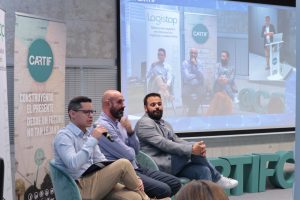
Innovation in high-tech capital goods
Javier Hernando, R&D director at Nicolás Correa and president of CBECYL (Clúster de Bienes de Equipo de Castilla y León) reviewed the main research and innovations that are transforming the machine tool from the perspective of the Nicolás Correa Group.
“Nowadays, the automation trend is global in all markets, there is no difference in geographical priorities. The difference in priorities is given by the size of the client company and, therefore, it is necessary to adapt to their needs”
Javier Hernando, R&D Director, Nicolás Correa; and President, CBECYL (Clúster de Bienes de Equipo de Castilla y León)
To end the day, Iñigo Bediaga, head of the ICT and automation department of the IDEKO Technology Centre / DANOBAT GROUP,presented the technologies applied to solving industrial problems based on the exploitation of data. Data, which are increasingly seen as sources of knowledge waiting to be exploited in order to improve social and economic processes, products, organisational processes (production and management) and markets, among others. In addition, he analysed the challenges presented by digital transformation in the manufacturing industry, through examples of successful cases of data exploitation in machining factories for different sectors.
Iñigo pointed out that, in a digitisation process, the first phase is to achieve a certain digitisation in the management of production, maintenance, etc. And, in a second phase, it will be necessary to automate and digitise the production assets in order to obtain data that can be used to improve the process and maintenance.
“In a digitalisation process, data sharing is going to be key and collaboration between companies, technology centres and start-ups is going to play a relevant role”
Iñigo Bediaga, head of the ICT and automation department, IDEKO Technology Centre / DANOBAT GROUP
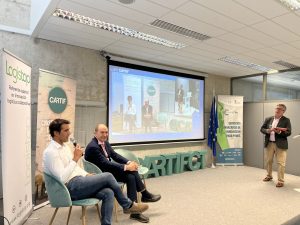
About Logistop
At Logistop we transform the supply chain through innovation, helping industry and companies to become more efficient and sustainable.
We are a multidisciplinary and inter-territorial working space in the logistics innovation arena formed by all the actors involved in the supply chain, as well as universities, technology centres, associations and specialised consultancy firms.
One of Logistop’s main objectives is:
- To promote the need for innovation among companies involved in the logistics sector;
- To promote innovation projects;
- To communicate the real needs of the sector at an institutional level.

